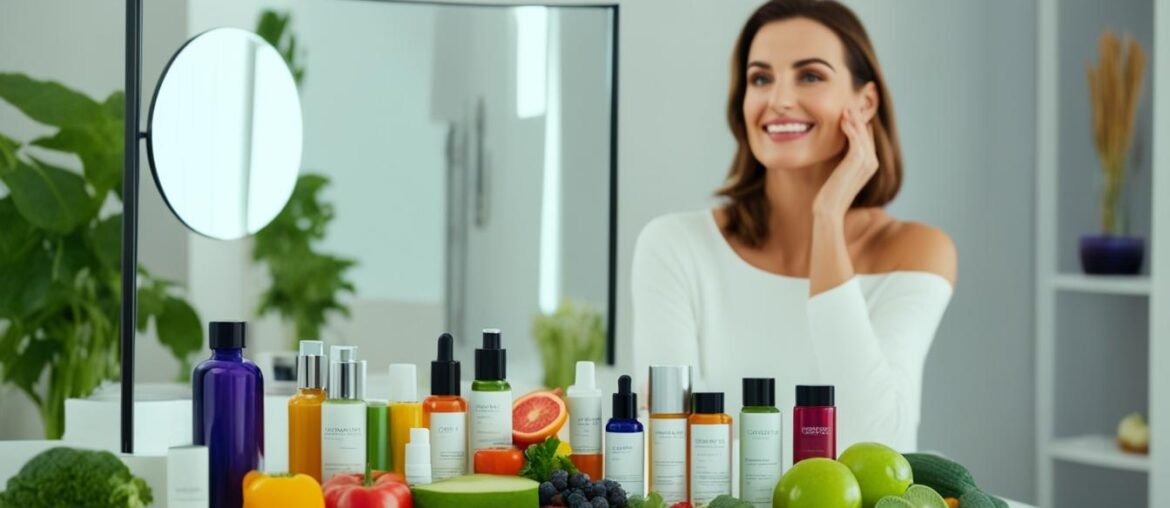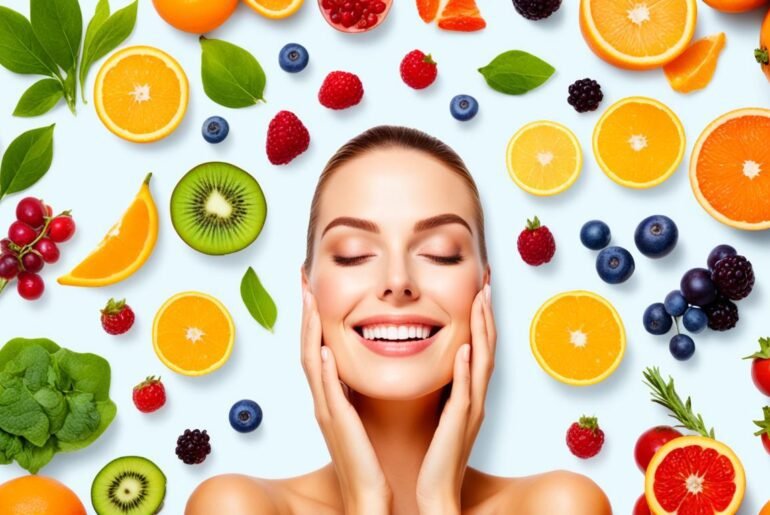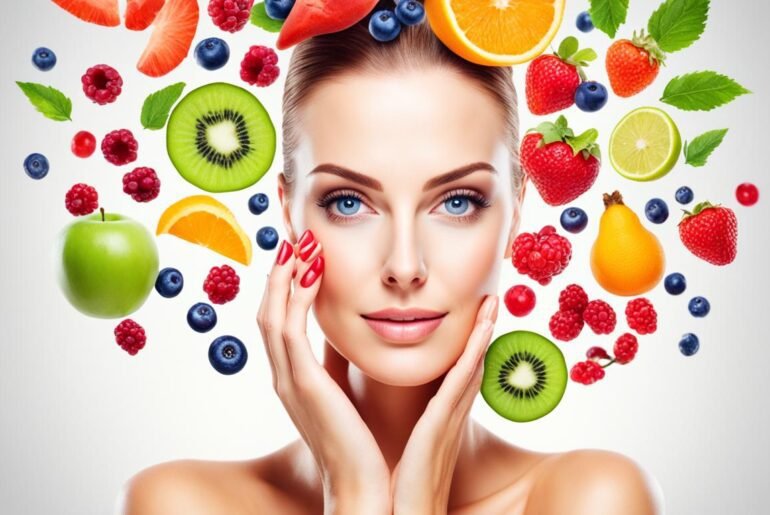Did you know that the skin is the largest organ in the human body? It covers an average area of about 22 square feet and weighs around 8 pounds! With such a significant presence, it’s no wonder that maintaining healthy skin is a top priority for many. One effective way to achieve skin health is by incorporating antioxidants into our skincare routine and diet. Antioxidants play a crucial role in protecting the skin from free radicals and oxidative stress, which can lead to aging and cell damage.
Key Takeaways:
- Antioxidants are essential for maintaining healthy skin and promoting a youthful complexion.
- They protect the skin from free radicals and oxidative stress, which can cause aging and cell damage.
- Incorporating antioxidants into our skincare routine and diet can improve hydration, reduce wrinkles and pigmentation, support healing processes, reduce inflammation, and enhance overall skin health.
- Topical antioxidant-rich skincare products and antioxidant-rich foods can provide significant benefits for the skin.
- Consistent use of antioxidant products, along with a holistic approach that includes a balanced diet, is key to achieving optimal skin health.
The Science Behind Antioxidants and Skin Health
Antioxidants play a crucial role in maintaining healthy skin and promoting a youthful complexion. They work by counteracting free radicals and oxidative stress, which are major contributors to skin aging and damage.
Free radicals are produced through metabolic activities and environmental sources. When left unchecked, they cause cell damage and inflammation, leading to DNA damage and accelerated skin aging.
However, antioxidants come to the rescue. They neutralize free radicals, protect against DNA damage, and stimulate collagen and elastin production. By doing so, antioxidants help reduce inflammation and promote overall skin health, helping you maintain a youthful and radiant complexion.
But why are these processes so important? Let’s dive deeper into the role of antioxidants in each aspect:
1. Protection against Free Radicals
Free radicals are unstable molecules that can damage cells in your body, including your skin cells. Antioxidants help neutralize these harmful free radicals, preventing them from causing further damage.
2. DNA Damage Prevention
DNA damage can lead to cellular dysfunction and affect the overall health and appearance of your skin. Antioxidants protect against DNA damage, helping to maintain the integrity of your skin cells.
3. Collagen and Elastin Production
Collagen and elastin are crucial proteins that provide strength, structure, and elasticity to your skin. Antioxidants stimulate the production of collagen and elastin, helping your skin stay firm and resilient.
4. Reduction of Inflammation
Inflammation is a common skin concern that can contribute to various skin conditions, such as acne and rosacea. Antioxidants have anti-inflammatory properties, which can help calm inflamed skin and promote healing.
By understanding the science behind antioxidants and their role in skin health, you can make informed decisions when it comes to incorporating them into your skincare routine and overall lifestyle.
No one wants to experience skin aging prematurely. The good news is that antioxidants can help slow down the aging process, allowing you to maintain a youthful and vibrant appearance.
Next, we’ll explore the various ways you can incorporate antioxidants into your skincare routine, both topically and through your diet.
Antioxidants in Skincare Products

Skincare products have embraced the power of antioxidants and their direct benefits for the skin. Topical antioxidants, such as retinoids (like retinol), vitamin C, vitamin E, ferulic acid, botanical extracts (such as green tea, coffee, and calendula), niacinamide, resveratrol, and curcumin, have become popular additions to skincare formulations.
These antioxidants offer a multitude of advantages when applied topically. They provide protection against harmful UV damage, calm inflammation, and slow down the signs of premature aging. These powerful ingredients can significantly enhance the overall appearance and texture of the skin, imparting a youthful and vibrant glow. To maximize the efficacy of antioxidant skincare products, it is crucial to choose formulations that combine different antioxidants to synergistically deliver optimal results.
Among the widely recognized antioxidants, retinoids have gained popularity for their remarkable anti-aging effects. They stimulate collagen production, reduce the appearance of wrinkles and fine lines, and improve skin texture and tone. Vitamin C, on the other hand, brightens the complexion, evens out skin tone, and protects against environmental damage. Vitamin E has excellent antioxidant and moisturizing properties, while ferulic acid enhances the stability and effectiveness of other antioxidants.
Botanical extracts, like green tea, coffee, and calendula, contain natural antioxidants that can soothe irritated skin, reduce redness, and minimize the harmful effects of free radicals. Niacinamide is known for its multiple benefits, including reducing hyperpigmentation, improving skin elasticity, and strengthening the skin barrier. Resveratrol and curcumin, found in grapes and turmeric respectively, possess potent antioxidant and anti-inflammatory properties that can help combat signs of aging and support overall skin health.
Integrating skincare products with topical antioxidants into your daily regimen can make a noticeable difference in your skin’s vitality. These products work synergistically to combat environmental stressors, improve skin texture, and enhance the skin’s natural defenses against aging and damage.
Benefits of Topical Antioxidants:
- Protection against UV damage
- Calming inflammation
- Slowing down premature aging
- Reducing the appearance of wrinkles and fine lines
- Brightening the complexion
- Improving skin texture and tone
- Soothing irritated skin
- Minimizing the effects of free radicals
- Reducing hyperpigmentation
- Enhancing skin elasticity
- Strengthening the skin barrier
Topical antioxidants provide a powerful arsenal against skin aging and damage, offering a range of benefits that can transform your skin’s appearance and radiance.
Antioxidants in Foods
Antioxidant-rich foods are nature’s gift for promoting skin health from within. These foods provide a rich source of vital nutrients that nourish and protect the skin. By incorporating antioxidant-rich foods into your diet, you can reap the benefits they offer for your skin’s well-being and radiance.
Fruits, vegetables, berries, and a variety of beverages such as green tea and red wine are excellent sources of antioxidants. Additionally, cacao and a wide range of herbs and spices contain high levels of these skin-loving compounds.
When it comes to antioxidant-rich foods, there is an impressive array of vitamins, minerals, carotenoids, flavonoids, and polyphenols at your disposal. Vitamins A, C, and E, as well as selenium and zinc, are just a few examples of the beneficial antioxidants found in these natural sources.
By consuming a diverse range of antioxidant-rich foods, you can provide essential support for your skin. These foods help improve skin hydration, protect against UV damage, stimulate collagen and elastin production, reduce inflammation, and enhance overall skin health.
Introducing a rainbow of fruits and vegetables into your meals, incorporating antioxidant-rich beverages like green tea, and adding cacao, herbs, and spices to your recipes can significantly contribute to your skin’s health and vitality.
Choosing the Right Skincare Products

When it comes to selecting skincare products, several factors need to be considered to ensure you are choosing the right ones for your skin. Let’s explore some essential considerations:
Skin Type
Understanding your skin type is crucial in selecting suitable skincare products. Whether you have oily, dry, sensitive, or combination skin, choosing products specifically formulated for your skin type can help address your unique needs effectively.
Sunscreen
Sun protection is paramount in maintaining healthy skin. Daily use of sunscreen with a broad-spectrum SPF of 30 or higher is highly recommended to shield your skin from harmful UV rays. Look for sunscreen that is lightweight, non-comedogenic, and provides broad-spectrum protection against UVA and UVB rays.
Retinoids
Retinoids, such as retinol, are powerful ingredients known for their anti-aging benefits. However, individuals with sensitive skin should exercise caution when using products containing retinoids, as they can cause irritation. It’s best to start with a low concentration and gradually increase usage to determine your skin’s tolerance.
Skin Allergies
If you have known skin allergies or sensitivities, it is essential to carefully examine the ingredient list of skincare products to avoid any potential triggers. Avoiding ingredients that have previously caused skin reactions can help prevent further irritation and maintain the health of your skin.
Product Formulation
The formulation of skincare products plays a crucial role in their effectiveness. Antioxidants, being key ingredients in skincare, need to be properly formulated and easily absorbed by the skin to provide the desired benefits. Look for products with stable formulations that ensure optimal delivery of antioxidants to your skin.
Skincare Routine
Having a consistent skincare routine is vital for achieving and maintaining healthy skin. Integrate antioxidant-rich products into your daily regimen to enhance the overall efficacy and results. Ensuring your skincare routine is tailored to your specific skin concerns can help address them effectively.
When selecting skincare products, consider your skin type, use sunscreen daily, be cautious with retinoids, be aware of skin allergies, assess product formulation, and integrate antioxidant-rich products into your skincare routine.
– Anonymous
| Product | Key Features |
|---|---|
| Sunscreen | – Broad-spectrum protection – Lightweight and non-comedogenic – SPF 30 or higher |
| Retinoids | – Anti-aging benefits – Start with low concentration – Gradually increase usage |
| Antioxidant-rich products | – Stable formulation for effective delivery – Easily absorbed by the skin |
Potential Drawbacks of Antioxidant Skincare Products
While antioxidant skincare products offer significant benefits, it’s essential to be aware of potential drawbacks. Understanding these drawbacks will help you make informed decisions about incorporating antioxidant products into your skincare routine.
Adverse Effects of High Doses
Using high doses of antioxidants for extended periods without medical advice can lead to adverse effects. It is important to follow recommended dosage guidelines and consult a healthcare professional for personalized advice. High doses can potentially disrupt the delicate balance of antioxidants in the body and have unintended consequences.
Variability in Product Effectiveness
The effectiveness of antioxidant skincare products can vary based on several factors. One crucial factor is the product formulation. Different antioxidants have different abilities to penetrate the skin and deliver their benefits effectively. Additionally, the skin’s ability to absorb antioxidants can vary among individuals. To maximize the benefits, choosing products with optimized formulations is key.
Researchers are actively studying and developing ways to improve product formulations for better antioxidant delivery to the skin. By enhancing the stability and bioavailability of antioxidants, the effectiveness of skincare products can be further optimized.
Sensitivity to Light, Air, and Temperature Swings
Antioxidants themselves are sensitive to degradation when exposed to light, air, and temperature fluctuations. This sensitivity can affect the potency and efficacy of antioxidant skincare products over time. To ensure product effectiveness, it is crucial to store them properly and follow any recommended storage instructions provided by the manufacturer.
| Drawbacks | Solution |
|---|---|
| Adverse effects from high doses | Consult a healthcare professional for personalized advice and follow recommended dosage guidelines. |
| Variability in product effectiveness | Choose products with optimized formulations and consider individual skin absorption capabilities. |
| Sensitivity to light, air, and temperature swings | Store products properly and follow recommended storage instructions to maintain potency and efficacy. |
Understanding the potential drawbacks associated with antioxidant skincare products allows you to make informed decisions about your skincare routine. By considering factors like adverse effects, product effectiveness, and formulation, you can optimize the benefits of antioxidants while minimizing any potential drawbacks. Always remember to consult with a healthcare professional or dermatologist for personalized advice tailored to your specific needs and skincare goals.
Antioxidants and Skin Conditions

Antioxidants have shown potential in preventing and improving various skin conditions, including vitiligo, atopic dermatitis, acne, and psoriasis. Studies have revealed lower levels of antioxidants, such as vitamin E, in patients with these skin diseases, indicating a possible link between antioxidant levels and their development. However, further research is necessary to fully understand the impact of antioxidants on these conditions.
Despite the need for additional research, some antioxidants, like vitamin E, have demonstrated potential in improving skin health for individuals with these specific conditions. For instance, topical application or consumption of vitamin E has shown promising effects in enhancing skin health and minimizing symptoms.
“The use of antioxidants for treating skin conditions like vitiligo, atopic dermatitis, acne, and psoriasis should be approached with caution.”
For example, in the case of psoriasis, antioxidants may help alleviate symptoms by counteracting oxidative stress, a key factor in the development and progression of the condition. Antioxidants can potentially modulate the inflammatory pathways associated with psoriasis, providing relief and improving overall skin health.
It is important to note that while antioxidants may offer benefits for skin conditions, their specific use and effectiveness should be evaluated in consultation with a dermatologist or healthcare professional. They can help tailor a treatment plan that includes antioxidants as part of a comprehensive approach to managing and improving skin conditions.
Antioxidants and Skin Conditions
| Skin Condition | Antioxidant Levels | Potential Benefits of Antioxidants |
|---|---|---|
| Vitiligo | Lower levels of antioxidants, such as vitamin E, have been found in patients with vitiligo | Potential improvement in skin health |
| Atopic Dermatitis | Lower levels of antioxidants, such as vitamin E, have been observed in individuals with atopic dermatitis | Possible reduction in inflammation and symptoms |
| Acne | Lower levels of antioxidants, such as vitamin E, have been noted in patients with acne | Potential improvement in overall skin health and reduction in acne symptoms |
| Psoriasis | Oxidative stress is involved in psoriasis, and antioxidants may help counteract its effects | Possible reduction in inflammation and improvement in skin symptoms |
The table above presents an overview of the relationship between antioxidants and various skin conditions. It highlights the lower levels of antioxidants observed in individuals with vitiligo, atopic dermatitis, acne, and psoriasis, as well as the potential benefits of antioxidants in improving skin health for these conditions.
The Role of Antioxidants in Preventing Skin Aging

Protecting our skin against the damaging effects of UV radiation is essential for maintaining a youthful and radiant complexion. UV rays can accelerate skin aging, leading to the appearance of wrinkles, pigmentation, and other signs of premature aging. Thankfully, antioxidants provide powerful protection against UV radiation and play a crucial role in preserving the health and appearance of our skin.
Antioxidants work by neutralizing the harmful effects of free radicals, unstable molecules that can damage our skin cells and DNA when exposed to UV light. By reducing DNA damage, antioxidants help prevent the development of age spots, wrinkles, and other visible signs of sun damage. They also stimulate collagen production, which can improve the skin’s elasticity and firmness, reducing the appearance of fine lines and wrinkles.
One of the key benefits of antioxidants is their ability to support the healing processes of the skin. When our skin is exposed to UV radiation, it can become inflamed and irritated. Antioxidants help calm inflammation and soothe the skin, promoting faster healing and minimizing the risk of long-term damage.
Furthermore, antioxidants improve hydration by strengthening the skin’s natural barrier function. This helps lock in moisture and prevent transepidermal water loss, keeping our skin plump, supple, and well-hydrated. Well-hydrated skin is more resilient and resilient to external stressors, reducing the risk of premature aging.
By incorporating antioxidants into our skincare routines and consuming antioxidant-rich foods, we can actively protect our skin against UV radiation, reduce the appearance of wrinkles and pigmentation, support the healing processes of the skin, and improve hydration.
“Antioxidants provide powerful protection against UV radiation and play a crucial role in preserving the health and appearance of our skin.”
To gain maximum benefits from antioxidants, consider using skincare products that contain antioxidant ingredients such as vitamin C, vitamin E, and green tea extract. These products can be applied topically to the skin and work to combat the damaging effects of UV radiation.
In addition to topical antioxidants, consuming a diet rich in fruits, vegetables, and other antioxidant-rich foods can provide internal support for our skin health. Berries, leafy greens, and nuts are particularly high in antioxidants and can help fortify our skin against UV damage from the inside out.
Here is a table showcasing some common antioxidant-rich foods:
| Food | Antioxidant Content |
|---|---|
| Blueberries | Rich in anthocyanins and vitamin C |
| Spinach | High in vitamin E, vitamin C, and beta-carotene |
| Almonds | Contain vitamin E and polyphenols |
| Green tea | Contains catechins and other polyphenols |
| Sweet potatoes | Rich in beta-carotene and vitamin C |
Incorporating antioxidants into our skincare routines and diets is a proactive approach to preventing skin aging and maintaining optimal skin health. By protecting against UV radiation, reducing wrinkles and pigmentation, supporting healing processes, and improving hydration, antioxidants play a vital role in preserving the youthfulness and vitality of our skin.
Incorporating Antioxidants in Your Skincare Routine

To benefit from antioxidants for skin health, it’s important to incorporate them into both your skincare routine and diet. Topical antioxidant-rich skincare products should be used daily as part of a comprehensive skincare routine to target specific concerns and protect the skin from external damage. Additionally, consuming a diet rich in antioxidant foods can provide internal support to enhance overall skin health. Taking a holistic approach and consistent use of antioxidant products are key factors in achieving the desired results.
| Skincare Routine | Dietary Intake |
|---|---|
|
|
A holistic approach that combines the use of topical antioxidants in your skincare routine and the consumption of antioxidant-rich foods will provide comprehensive support for your skin. By protecting your skin externally and nourishing it internally, you can enhance the overall health and appearance of your skin.
Consistency is Key
Incorporating antioxidants in your skincare routine and diet is most effective when done consistently. The benefits of antioxidants accumulate over time with consistent use, allowing your skin to reap the long-term rewards. Make it a habit to prioritize your skincare and dietary choices, giving your skin the continuous support it needs to thrive.
The Power of Antioxidant Supplements
Antioxidant supplements can be a valuable addition to support skin health. While incorporating antioxidants into your diet through a balanced and nutritious meal plan is essential, supplements can provide additional support. However, it is crucial to consult with a healthcare professional before starting any antioxidant supplements, as they may interact with medications.
Incorporating antioxidant supplements into your routine should be done under medical advice to ensure safety and effectiveness. Certain medications, such as blood thinners or chemotherapy drugs, may have interactions with antioxidant supplements. It’s important to have a thorough understanding of any potential interactions and the appropriate dosage to avoid adverse effects.
While supplements can offer additional antioxidants, it’s important to note that they should not replace a well-rounded and balanced diet. Obtaining antioxidants from a variety of foods is generally considered the most effective way to support overall health, including skin health.
“Antioxidant supplements can be a valuable addition to support skin health, but it is crucial to consult with a healthcare professional before starting any supplements, as they may interact with medications.”
Consulting with a healthcare professional will provide personalized guidance on incorporating antioxidant supplements into your routine. They can assess your current diet, lifestyle, and medical history to determine the most appropriate course of action.
It is important to remember that supplements should be used in conjunction with a balanced diet and an overall healthy lifestyle. Relying solely on supplements without paying attention to other aspects of your health may not yield the desired outcomes. Therefore, it is advised to adopt a holistic approach, incorporating antioxidant-rich foods into your meals and following a consistent skincare routine.
In conclusion, antioxidant supplements can certainly contribute to supporting skin health, but it is vital to seek medical advice and ensure they are used in conjunction with a diverse and nutrient-rich diet. Striving for a balanced approach that combines both supplementation and dietary intake can help unlock the full potential of antioxidants for optimal skin health.
Conclusion
Incorporating antioxidants into your skincare routine and diet can have a significant impact on your skin health, resulting in a more youthful complexion. Antioxidants are powerful in protecting your skin from free radicals and oxidative stress, effectively preventing skin aging and cell damage.
By using topical antioxidant-rich skincare products and consuming antioxidant-rich foods, you can enjoy a wide range of benefits. These include reducing the appearance of wrinkles and pigmentation, boosting collagen production, improving hydration, and supporting the healing processes of your skin.
To achieve optimal skin health, it is important to maintain a holistic approach. Consistently incorporating antioxidant products into your skincare routine, along with a balanced diet, will enhance the effectiveness of your efforts. Remember, everyone’s skin is unique, so it is advisable to consult with a dermatologist or healthcare professional who can provide personalized guidance tailored to your specific needs.
FAQ
How do antioxidants benefit the skin?
Antioxidants protect the skin by neutralizing free radicals and oxidative stress, preventing aging and cell damage. They can improve hydration, reduce wrinkles and pigmentation, support healing processes, reduce inflammation, and soften the skin.
What are some examples of topical antioxidants in skincare products?
Some popular topical antioxidants include retinoids (such as retinol), vitamin C, vitamin E, ferulic acid, botanical extracts (e.g., green tea, coffee, calendula), niacinamide, resveratrol, and curcumin.
Which foods are rich in antioxidants for skin health?
Antioxidant-rich foods include fruits, vegetables, berries, beverages (such as green tea and red wine), cacao, and herbs/spices. These foods provide essential nutrients that promote skin health from within.
How should I choose the right skincare products with antioxidants?
When selecting skincare products, consider factors such as your skin type, sensitivities, and specific concerns. It’s important to be aware of any allergies or irritations and avoid products that may exacerbate these conditions. Assessing the product formulation and incorporating a variety of antioxidants is crucial for maximum effectiveness.
Are there any potential drawbacks to using antioxidant skincare products?
Using high doses of antioxidants for prolonged periods without medical advice may lead to adverse effects. Additionally, the effectiveness of antioxidant products can vary based on the product formulation and the skin’s ability to absorb the antioxidants.
Can antioxidants help with specific skin conditions?
While further research is needed, lower levels of antioxidants have been found in conditions such as vitiligo, atopic dermatitis, acne, and psoriasis. Some antioxidants, like vitamin E, have shown potential for improving skin health in these conditions.
How do antioxidants protect against skin aging?
Antioxidants protect the skin from UV radiation, reduce DNA damage, stimulate collagen production, improve hydration, and support the skin’s healing processes. They also help reduce the appearance of wrinkles, fine lines, and pigmentation.
How can I incorporate antioxidants into my skincare routine?
Incorporate topical antioxidant-rich skincare products into your daily routine and consume antioxidant-rich foods to support skin health from within. Taking a holistic approach and consistent use of antioxidant products are key for optimal results.
Are antioxidant supplements beneficial for skin health?
Antioxidant supplements can be beneficial, but it’s crucial to consult with a healthcare professional before starting any supplements, as they may interact with medications. Supplements should be used in conjunction with a balanced diet and an overall healthy lifestyle.
How can I optimize skin health with antioxidants?
By incorporating antioxidants into your skincare routine and diet, you can significantly improve skin health and promote a more youthful complexion. Consistent use of antioxidant products, in conjunction with a holistic approach that includes a balanced diet, can help achieve optimal skin health.




